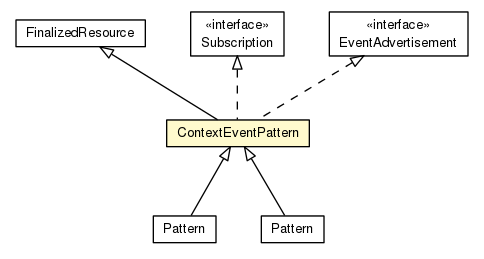Class ContextEventPattern


public class ContextEventPattern extends FinalizedResource implements EventAdvertisement, Subscription
| Modifier and Type | Class and Description |
|---|---|
class |
ContextEventPattern.Indices |
| Modifier and Type | Field and Description |
|---|---|
static String |
MY_URI |
ANON_URI_PREFIX, blockAddingTypes, isXMLLiteral, NAMESPACE_PREFIX, ns_delim_index, PROP_INVOLVED_HUMAN_USER, PROP_RDF_FIRST, PROP_RDF_REST, PROP_RDF_TYPE, PROP_RDFS_COMMENT, PROP_RDFS_LABEL, PROP_SERIALIZATION_FULL, PROP_SERIALIZATION_OPTIONAL, PROP_SERIALIZATION_REDUCED, PROP_SERIALIZATION_UNDEFINED, props, RDF_EMPTY_LIST, RDF_NAMESPACE, RDFS_NAMESPACE, SERVICE_NAMESPACE, TYPE_RDF_LIST, TYPE_RDFS_CLASS, uri, VOCABULARY_NAMESPACE| Constructor and Description |
|---|
ContextEventPattern() |
ContextEventPattern(String instanceURI) |
| Modifier and Type | Method and Description |
|---|---|
boolean |
addRestriction(MergedRestriction r)
Add a restriction to the pattern, thus narrowing the events that will
match the pattern.
|
ContextEventPattern.Indices |
getIndices() |
boolean |
isClosedCollection(String propURI)
Returns true if the value of the given property should be treated as an
rdf:List.
|
boolean |
isWellFormed()
Returns true, if the state of the resource is valid, otherwise false.
|
boolean |
matches(ContextEvent ce) |
boolean |
matches(ContextEventPattern subset) |
boolean |
matches(Matchable subset) |
boolean |
setProperty(String propURI,
Object property)
Adds a statement with this resource as the subject, the given
propURI as the predicate and the given value as the object. |
addType, getLocalName, getNamespace, getProperty, getPropertyURIs, getType, getTypes, getURI, hasQualifiedName, isAnon, numberOfPropertiesaddMultiLangProp, asList, asList, asRDFList, changeProperty, copy, deepCopy, equals, generateAnonURI, getDefaultLang, getFilename, getMultiLangProp, getOrConstructLabel, getOrConstructLabel, getPropSerializationType, getResource, getResourceComment, getResourceLabel, getResourceLabel, getStaticFieldValue, hashCode, hasProperty, isAnon, isBlockingAddingTypes, isQualifiedName, literal, representsQualifiedURI, serializesAsXMLLiteral, setPropertyPath, setPropertyPath, setPropertyPathFromOffset, setResourceComment, setResourceLabel, toString, toStringRecursive, toStringRecursive, unliteralpublic static final String MY_URI
public ContextEventPattern()
public ContextEventPattern(String instanceURI)
public boolean addRestriction(MergedRestriction r)
r - The Restriction to addNullPointerException - if the restriction is nullpublic ContextEventPattern.Indices getIndices()
public boolean isClosedCollection(String propURI)
ResourceList is assumed to be a closed collection
(unless it is specifically an instance of OpenCollection).
Subclasses can change this, if needed.isClosedCollection in class ResourceResource.isClosedCollection(java.lang.String)public boolean isWellFormed()
ResourceSubclasses should overwrite this methods as the default implementation returns always true.
isWellFormed in class Resourcepublic boolean setProperty(String propURI, Object property)
ResourcepropURI as the predicate and the given value as the object.
Subclasses must override this in order to decide if the statement to be
added fits the general class constraints. If not, the call of this method
should be ignored. For each property only one single call may be made to
this method, unless subsequent calls to this method for setting the value
of the same property are treated as an update for an update-able
property. Multi-valued properties must be set using an instance of
List. The differentiation, if a such list should be
treated as an rdf:List, can be made with the help of
Resource.isClosedCollection(String). The default implementation here
accepts all property-value pairs blindly except for rdf:type which is
handled if the value is a type URI, a Resource or a java.util.List of
them.
Note: The setting of the property rdf:type is being handled by this class
via the final methods Resource.addType(String, boolean),
Resource.getType(), and Resource.getTypes(). Although these methods give
the view of handling type URIs as strings, but in reality the types are
stored as direct instances of this class. So, the subclasses should
ignore calls for setting rdf:type; if not, then the subclass must pay
attention that the value should be a List of direct instances of
this class so that (1) the Resource.toString() method returns just the
URI and (2) the serializers get no problems with the value. Also,
settings via subclasses may be overwritten by this class if a subsequent
call to Resource.addType(String, boolean) is made.
setProperty in class Resourcepublic boolean matches(Matchable subset)
matches in interface MatchableMatchable.matches(Matchable)public boolean matches(ContextEvent ce)
public boolean matches(ContextEventPattern subset)
pattern - the ContextEventPattern to matchCopyright © 2018 universAAL Consortium. All rights reserved.